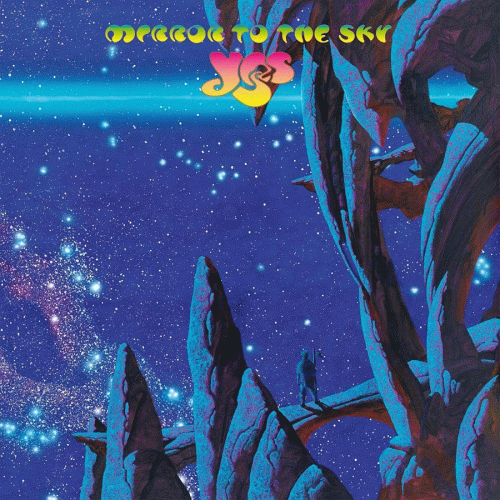Safety in (Long) Numbers: The Herd Instinct of the Sacred Cow
It's tempting to imagine how the fruit would have fallen in the prog orchard without the midnight raid visited upon it from this genteel and hirsute gang of apple scrumpers. Without '
Close To The Edge' to refer to, most of the genre's laziest opponents would still be voicing shrill indifference at the output of those it inspired as that befitting hippy classical wank bashed out on
electronic gizmos. Like most successful artistic phenomena, its visibility in terms of marketing, sales and exposure has conspired for consumer sovereignty to deign this album as being representative of an entire genre. But we know better on this website. (e.g. classical music? yeah it all sounds like boring Bach innit?
Once again readers we are faced with the dichotomy between a document's avowed influence and its musical merit. Both criteria surely demand cognisance of context i.e. in 1972 when most of you were still but a crease in your daddy's slacks, 'Tarkus, Supper's Ready, A Plague of Lighthouse Keepers, Thick as a Brick, Valentyne Suite' and 'Echoes' were already 'on the shelves' jockeying for position as frontrunners in an obstacle course of Prog's own design. Therefore this albums innovation and prescience pales somewhat when compared to the contemporary developments in music at the time of its release. That is not to say that '
Close To The Edge' rode the slipstream of the aforementioned pioneers, just that 'Yes' were a damn sight better at polishing second hand jewellery than the owners were at securing it.
Although I have cited musical precedents from ELP,
Genesis,
Jethro Tull, VDGG,
Colosseum and
Pink Floyd, it seems clear that the only common element to all is that of running time. Yep, big long convoluted epics that even Wagner after rolling a 'big fatty' would have baulked at. Why Prog in particular should be so obsessive about ensuring the fat lady sheds some of that adipose tissue
before her finale is beyond me. Are Bach's fugues considered 'horrid girly bubblegum' because they are shorter than his concertos?
Where '
Close To The Edge' becomes unique is that it does not exploit any of the structural tricks and compositional conceits used by its contemporaries. Where Emerson would assimilate classical sources and themes into his own creations and
Genesis would segue shorter song and instrumental fragments into a pseudo suite, 'Yes' dispense with either approach entirely. '
Close To The Edge's title track is a pop song, Yes, one mother of a long one to be sure, but still a
pop song for all that. Don't let the 'P' word cause your heckles to rise here, as I mean 'popular music song' and not in any pejorative sense.
Furthermore:
There are no traces of classical symphonic writing to be found.(Which often explains their 'symphonic prog' label stubbornly refusing to adhere to the bottle) Jazz and blues vocabulary are absent. Riff based composition is nowhere to be seen.
These are observations, not criticisms as there is much to admire and cherish on this very fine album but I do think it is long overdue some sort of critical revision as for way too long 'CTTE' has become akin to Prog's (white) elephant in the room.
True to form, Howe's overly fussy playing, 'protesting chicken' guitar tone and ego the size of of a Yes equipment truck, continue to grate throughout. Steve's unchallenged virtuosity makes him easy to admire, but much harder to love. Wakeman is a gloriously unashamed ham, and brings a healthy irreverence to all things 'Yes' as without his mordant sensibilities I fear that the rest of the
band would have completely disappeared up their own backsides long ago. As ever, Rick's eloquent playing and apt choice of sounds is an absolute pleasure avalanche (see his panto villain 'Hammer House of Horror' gothic cathedral organ circa 12 mins and try not smiling) Squire delights on just about everything I have ever heard him play on and his gutsy overdriven Rickenbacker is one of prog's most precious phenomena.
Chris Squire, I love you and want to have your babies.
Mr Anderson does not so much have a mystical streak, but a secular streak which visits him only when his northern orifice is miles from a microphone. Seems such a splendid and reasonable chap otherwise but what lollies were you sucking on in 1972 Jon?:
"My eYes convinced, eclipsed with the younger moon attained with love.
It changed as almost strained amidst clear manna from above.
I crucified my hate and held the word within my hand.
There's you, the time, the logic, or the reasons we don't understand"
"Coming quickly to terms of all expression laid, Emotion revealed as the ocean maid, As a movement regained and regarded both the same, All complete in the side of seeds of life with you"
Smoking is bad for you, ask Wagner.
Bill Bruford has always been one of my favourite drummers and there are on '
Close To The Edge'sections where, in conjunction with Squire's snappy and guttural bass, 'Yes' stray as close as they ever got to within the forbidden outskirts of 'Funkytown'
As accomplished as so much of the music is, I still cannot get my head around the instrumental introduction to this album i.e. that 3 minute freeform Howe dominated squawkfest 'the less than Solid time changes in 3/4' where not content with just trading licks, Yes appear to swap instruments also. It doesn't even sound like Yes and I can't think of a similar instance of such ugliness in their entire discography.
As my old history teacher used to say:
"The graveyards are full of indispensable men".

 Yes : Close To The Edge
Yes : Close To The Edge






















Tienes que ser miembro para poder añadir un comentario